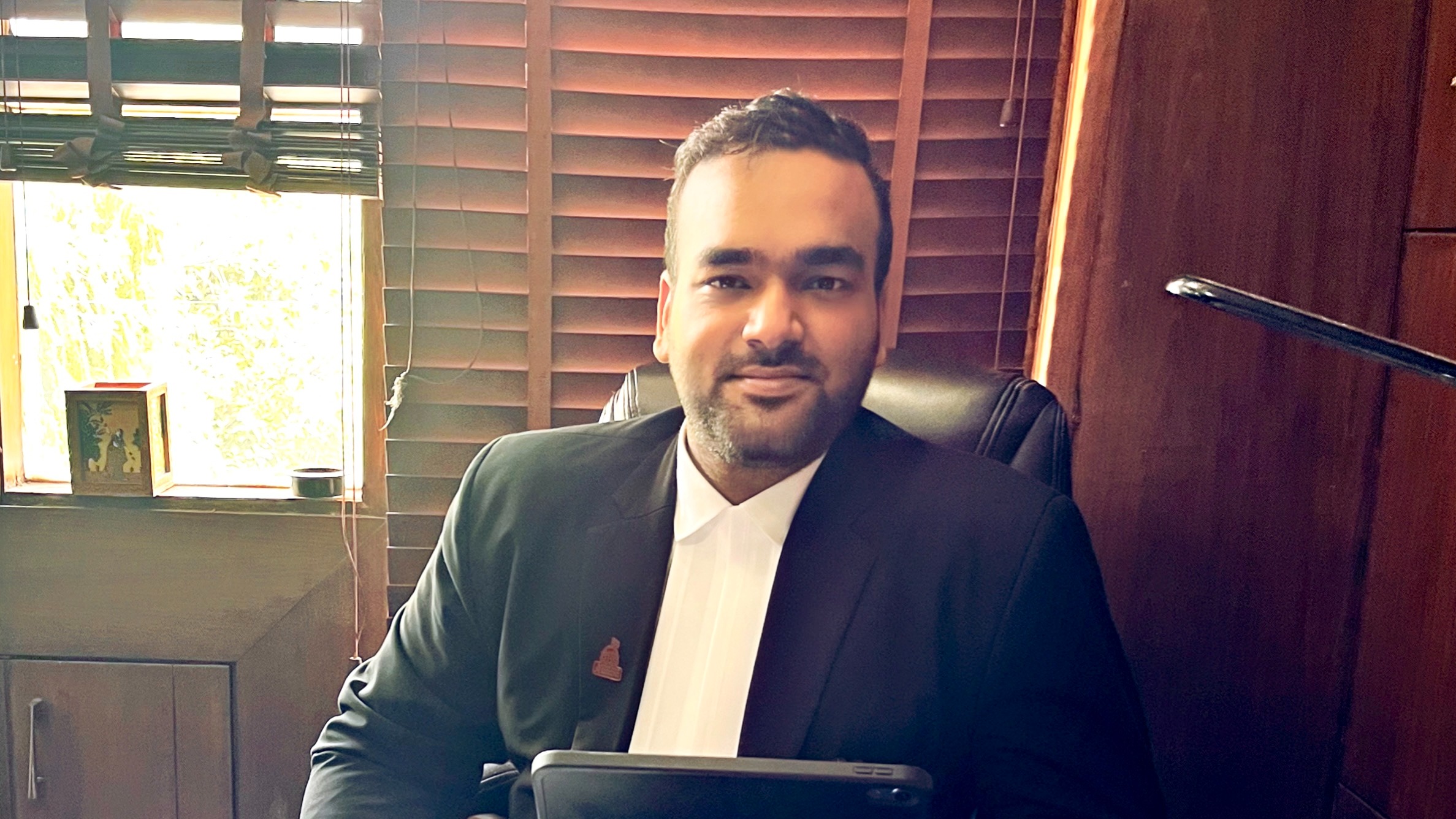This interview has been published by Anshi Mudgal and The SuperLawyer Team
Growing up in Siliguri, far from the conventional legal hubs, what influenced your decision to pursue law, and how did your years at Chanakya National Law University shape your early perspective on the profession?
Growing up in Siliguri and studying at Don Bosco School shaped me in many ways. At home, the environment was always encouraging. I was an average student in academics, but active in debates, quizzes, and other co-curricular activities. With the benefit of hindsight, those experiences built my confidence- something I still consider as my biggest asset. Initially, I was preparing for a career in engineering, but somewhere along the way, I realized it wasn’t something I could truly be passionate about. My parents stood by me wholeheartedly. It was then that I decided to choose law.
My years at CNLU were truly defining. Coming from a younger NLU, we were always conscious that we had to work harder to stand out. A new institution brought with it both challenges and opportunities, and much like our university, we were eager to carve out our own space in the larger scheme of things. Those 5 years taught me the importance of taking ownership of one’s plans and seeing them through. Most importantly, CNLU gave me the final clarity that litigation – with all its pros and cons- was the path I really wanted to pursue. That conviction has guided almost every professional decision I have made thereon.
In the initial phase of your career, you worked closely with the litigation team for over four years. What were some of the most formative experiences during this time, particularly in handling matters related to taxation, constitutional, and regulatory law?
I began my career with the litigation team at PDS Legal, New Delhi, under Mr. Tarun Gulati. I had interned there during law school and was fortunate to receive a pre-placement offer in my final year. As someone new to both the city and the profession, I found tremendous support from my team and colleagues, who helped me settle in and grow.
The foundation of my advocacy was built at PDS Legal- right from drafting and preparing a matter to eventually presenting it in court. If there is one lesson I particularly carry from those years, it is that effort alone is not enough; planning and organisation are equally critical. Clients and colleagues alike value a professional who is methodical in approach. My seniors were patient and supportive, and my peers were always helpful, which kept the momentum going in what could otherwise have been a daunting phase. Looking back, my time at PDS Legal not only gave me the skills but also the confidence and clarity to eventually venture out and establish my independent practice.
Transitioning from a structured law firm environment to establishing your independent practice in 2021 must have been a pivotal moment. What motivated this move, and what were the initial challenges and learnings in setting up on your own?
I had always wanted to establish my own practice. The satisfaction of building something of your own is unparalleled, and that desire kept me motivated. At the same time, my early days in litigation taught me that there is only so much you can prepare from the sidelines – you have to take the plunge, start from scratch and build gradually.
The switch was not easy. Coming from a law firm where I was constantly working on heavy matters to suddenly having only a handful of briefs was a stark contrast. It is natural to have doubts and question your decision. But if you ask me, the real trick is to hang in there. Independent litigation is a choice you make every single day, despite the distractions and the reasons that may tempt you to leave. In the end, this profession rewards perseverance and patience. If you stay the course and keep developing yourself, things do fall into place.
Since then, you have handled a wide spectrum of commercial, criminal, and civil disputes. Could you share one of the most challenging cases from your independent practice that significantly strengthened your confidence as a litigator?
It is difficult to pinpoint a single case that became the fulcrum of my practice. For me, it has been a series of moments that reassured me I had made the right choice in setting up independently. One such matter was when a doctor’s license to practice had been suspended by a High Court in a contempt proceeding. I had the opportunity to lead the matter in the Supreme Court, and we managed to secure the desired relief. That case gave me something invaluable at that stage- acknowledgment, financial stability, and, most importantly, confidence as a litigator.
Another turning point was when I first started handling criminal matters. Having had little exposure to criminal law during my time at the firm, those cases initially felt daunting. But they also reinforced a simple truth: in litigation, effort makes all the difference. If you are willing to put in that extra bit of preparation, you will eventually find your footing. Both these experiences strengthened my belief that perseverance pays, and that independent practice, though challenging, was the right path for me.
In 2025, you achieved the distinction of becoming an Advocate-on-Record. What inspired you to pursue this qualification, how was your preparation journey, and in what ways has the AoR title impacted your practice and professional opportunities?
Becoming an Advocate-on-Record was always a clear goal for me once I started my independent practice. Practising in Delhi makes you realize very early how competitive the profession is, and that the Supreme Court is the final stop for matters from across the country. When you pitch for mandates in the Supreme Court, the first question often asked is- Are you an AoR? If your answer is no, it does have a bearing, especially with clients outside Delhi. Qualifying the exam, therefore, gives you that foot-in-the-door and instills an additional layer of confidence in clients.
Preparing for the exam definitely demands seriousness. Like most who clear it, I had to balance practice with study, which sometimes may get a bit difficult. I was fortunate to have friends and seniors who supported me—whether with study materials or helping me manage my matters. But I believe one thing must be acknowledged: preparing for the AoR exam is in itself an enriching experience. Irrespective of the result, you come out a better professional.
Alongside your practice, you often engage with law students through moots and guest lectures. How do you view the balance between active practice and mentoring the next generation of lawyers?
I genuinely enjoy interacting with students- there’s always a fresh perspective and a new learning to take away. Having been on that side of the spectrum myself, I know how good it is to have people from the profession engage with you. Judging moots or delivering guest lectures is also a great way to sharpen my own legal acumen, whenever you discuss an issue, you inevitably end up learning too. Balancing it with active practice is not always easy, but whenever I get the opportunity, I truly enjoy taking it up.
Looking ahead, with your growing independent chamber and experience across varied domains, what vision do you hold for your practice over the next decade, and what advice would you offer to young lawyers aspiring to build a career in litigation?
For me, every professional is a brand in himself, and the journey is really about improving that brand each day. My vision over the next few years is to evolve as a reliable practitioner and to build a team that is known for being effective and dependable in the legal community. Reputation in this profession takes years to build but can be lost in a moment, so the aim is to grow steadily, sincerely- and also to enjoy the process along the way.
I don’t think I am in a position to give advice, but I can share my story. If there’s one thing I have learnt, it is that this profession rewards patience, perseverance, and planning. At the same time, litigation is not a one-time choice; it’s something you must choose every single day despite the distractions and difficulties. And while doing all of this, it is equally important to have fun and enjoy the process- because that’s what makes the journey worthwhile.
With new legal developments and judicial precedents emerging almost daily, how do you keep yourself updated on the latest trends and ensure that your practice stays aligned with the evolving legal landscape?
For me, curiosity and social consciousness are an asset in this profession. A lawyer should always be curious about the things happening around him, both inside and outside the courtroom. I genuinely enjoy reading, and I feel any lawyer who enjoys reading will always have an edge. We live in an age where information is power, and with technology, access to that information has become much easier than it used to be. There are plenty of platforms today that help us stay updated with what’s happening around.
But beyond books and screens, our courts themselves are exciting places to learn. I’ve often found that indulging in conversations in the corridors, sometimes over a simple cup of coffee, leaves you walking away with more insight than you bargained for. That in itself sounds like a good deal !
Get in touch with Yashwant Singh –




I’m very glad to read each and every word of interview , It’s very inspiring 🎵 to sound your children.
Wishing you great endeavour 😊
Nice